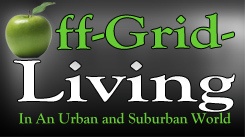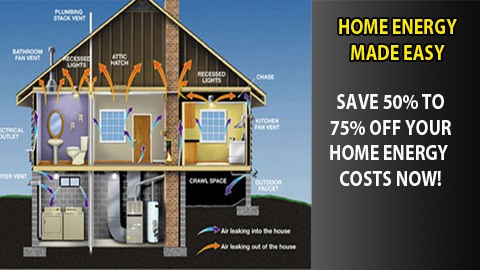
“The most common way people give up their power is by thinking they don't have any.”
Alice Walker

A Guide to Off-Grid Generators
Are you looking to purchase a off grid generator for your home? A trustworthy and robust generator is an extremely valuable asset. Here is an introduction to generators if you have plans to live off-the-grid.
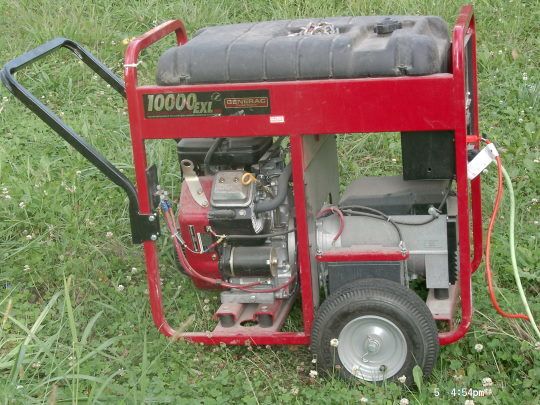
Why Should You Include A Generator In Your Off-Grid Energy Plan?
Generators are mainly used for convenience. Regardless of how efficient or good a set-up is for a hydro, wind-power, or solar system, there will be many times when things can go wrong. Here are a few scenarios to consider:
Repairs
Every wind power, hydro, or solar system will need repairs or break at some stage or another. Repairs on solar panels could take as long as 2 to 3 weeks when sending them away. If you are repairing your wind turbines or hydro system, this also costs energy and time. Your generator can perform as a reliable substitute during these times, and assist with maintaining your usual energy-production levels.
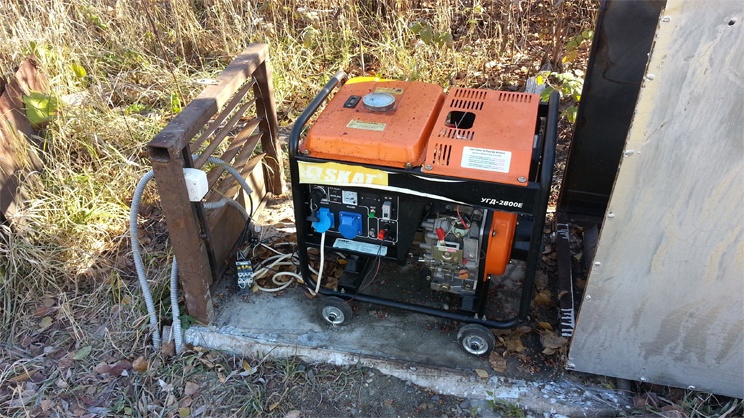
Cloudy Or Rainy Days
Many homeowners run generators when the weather is cloudy so that their batteries are fully charged. Even if you are using a very big solar system, a generator is very helpful when you need supplemental energy.
Budget
Going off the grid can be an expensive exercise. The equipment that you will need often adds up quickly. A reliable generator is one of the best ways to match up to your energy requirements until you are at the stage that you are ready to switch over to an alternative energy system.
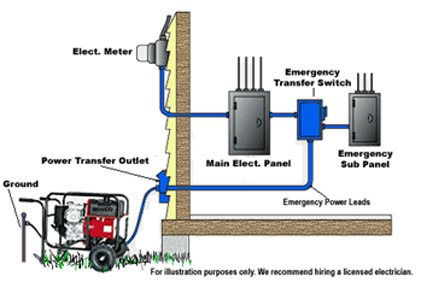
The next step to purchasing a generator involves choosing between a conventional or inverter generator.
Conventional Generators
Conventional generators produce power that fluctuates. For this reason, conventional generators are not recommended for running smaller electronics since a power spike can damage these sensitive devices.
Conventional Generator Pros:
More Power: If you require a lot of power, conventional generators are usually the better choice
Large Fuel Tanks: These generators typically have much bigger fuel tanks when compared to inverter generators.
Cost: Conventional generators are a lot more budget-friendly when compared to inverter generators.
Conventional Generator Cons:
Noise: Generators all have decibel ratings, abbreviated as either dBA or dB. This rating indicated how loud a generator is when it runs. Conventional generators usually have a high decibel rating when compared to inverter generators, typically between 65-75 decibels.
Dirty Electricity: Many people say that conventional generators produce "dirty" power. This means that the power is less "consistent" when compared to inverter generators. This won't make a difference to large equipment and appliances, but this will matter for sensitive appliances such as phones and TVs.

Inverter Generators
Inverter generators produce AC Power that converts into DC and then converts back to AC power. Due to this, power production is far more stable when compared to conventional generators, making them safe for small electronics.
Inverter Generator Pros:
Portable: Many of the inverter generator models are lightweight and compact, which makes them convenient to move around your home.
Quieter: Inverter generators run much quieter when compared to conventional generators.
Cleaner Electricity: The inverter generators produce much smoother electricity when compared to conventional generators. This type of electricity is far more suited to sensitive electronics like TVs, phones, power tools, and computers.
Fuel-Efficient: Inverter generators usually feature a compact design, and they also usually offer the option to adjust the speed of the engine according to your requirements. This means that these machines use fuel far more efficiently than conventional models.
Inverter Generator Cons:
Smaller Fuel Tanks: The inverter generators usually only have 2 to 4-gallon tanks compared to 9 to 12-gallon tanks in the conventional generators.
Costs More: Inverter generators cost a lot more than conventional generators.
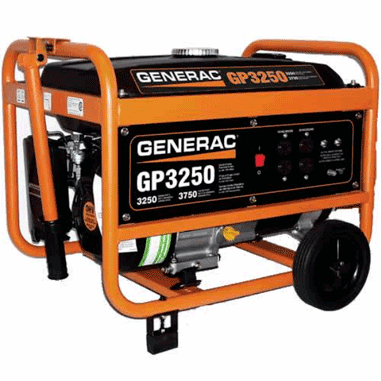
Choosing A Fuel For Your Generator
The fuel-powered generators run on propane, gasoline, natural gas, or diesel, while the hybrid generators provide multiple options. Here is a list of a few of the advantages and drawbacks to help you decide on what is best for your current situation.
Propane
Pros:
- Burns clean
- Long shelf-life
- Stored in both smaller or large tanks
- Propane generators usually have quieter engine noises compared to others
Cons:
- Fuel is expensive
- Propane starts to derate at around -20 degrees above-zero
- In comparison to diesel, a propane generator has a shorter life expectancy and increased fuel-consumption rates
Gasoline
Pros:
- Easy to obtain and common source of fuel
- Increases the portability of the smaller generators
Cons:
- Very short shelf-life (12 months)
- Highly flammable
- Somewhat expensive

Natural Gas
Pros:
- Excellent for colder climates since natural gas performs very well in icy or cold weather
- Burns clean
Cons:
- Natural gas starts to derate at around +20 degrees above-zero
- Shorter life-expectancy and increased fuel-consumption rates in comparison to diesel
- Not one of the off-the-grid fuel sources

Diesel
Pros:
- Fuel is easy to obtain
- Least flammable out of all the fuel sources
- Least expensive
Cons:
-Without additives, diesel can last 18 to 24 months
-Diesel generators run more fuel-efficient and better when loaded at 70% to 80%. When running for long periods of time with lighter loads, the engine can start to smoke, due to the injectors becoming carbonized.
Hybrid Bi-Fuel / Dual Fuel
Hybrid generators provide you with the flexibility and freedom to choose the type of fuel that you prefer.
Pros:
-Provides you with more options in case your fuel source has run out, or you are faced with an emergency.
Cons:
Most of the cons listed with the other fuel sources will also apply here. For example, gasoline has a much shorter shelf life and is very flammable.
The diesel generators should be running at 70% or higher to avoid smoking.
Propane generators feature fuel systems that are more complex making them more expensive to repair or maintain.
Natural gas is not regarded as one of the off-grid fuel options.


Solar Hot Water Collector: The Best Guide to Building and Installing a Solar Hot Water System
Hello there, fellow solar enthusiasts! It’s great to be talking with you

Hybrid Solar Wind Power Generation System: Best Comprehensive Guide to Building Your Own Renewable Energy Solution
Hello there! If you are looking for an alternative energy source that

Solar Heating System: Best Comprehensive Guide to Building and Installing a Solar Heating System
As a solar heating system expert, I have seen firsthand how this

Solar Cooling: How to Keep Your Home Cool with Solar Energy?
Hey there, folks! As a solar cooling consultant with years of experience

Stand Alone Solar Power System: How to Build an Off-Grid Solar Power System for Your Home?
As the demand for sustainable energy solutions increases, stand alone solar power

Solar Heating Systems: The Different Types and Benefits Of Solar Heating Systems
As a solar heating systems expert, I know that these innovative technologies
Conclusion
Thus, by knowing a few facts about hydroponic gardening you can easily decide about developing a hydroponic herb garden in your apartment.

Solar Hot Water Collector: The Best Guide to Building and Installing a Solar Hot Water System
Hello there, fellow solar enthusiasts! It’s great to be talking with you

Hybrid Solar Wind Power Generation System: Best Comprehensive Guide to Building Your Own Renewable Energy Solution
Hello there! If you are looking for an alternative energy source that

Solar Heating System: Best Comprehensive Guide to Building and Installing a Solar Heating System
As a solar heating system expert, I have seen firsthand how this

Solar Cooling: How to Keep Your Home Cool with Solar Energy?
Hey there, folks! As a solar cooling consultant with years of experience

Stand Alone Solar Power System: How to Build an Off-Grid Solar Power System for Your Home?
As the demand for sustainable energy solutions increases, stand alone solar power

Solar Heating Systems: The Different Types and Benefits Of Solar Heating Systems
As a solar heating systems expert, I know that these innovative technologies
